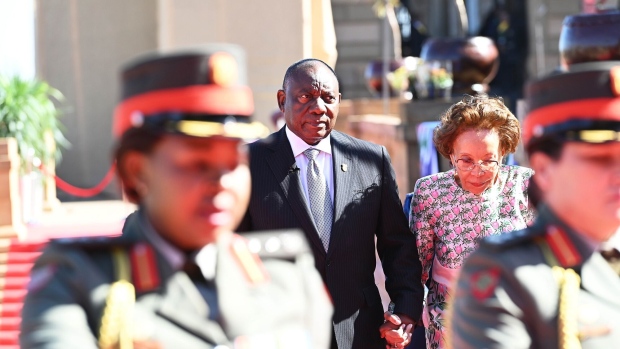Jun 19, 2024
Ramaphosa Is Sworn In for New Term as South African President
, Bloomberg News

(Bloomberg) -- Cyril Ramaphosa was sworn in for another term as South Africa’s president, three weeks after elections stripped his party of its parliamentary majority and forced it into a power-sharing alliance with long-time rivals.
Ramaphosa took the oath of office before Chief Justice Raymond Zondo in the Nelson Mandela amphitheater at the 111-year-old Union Buildings in the capital, Pretoria, on Wednesday. Nigerian President Bola Tinubu, Democratic Republic of Congo leader Felix Tshisekedi and Zimbabwe’s Emmerson Mnangagwa were among the dignitaries at the ceremony, which was followed by a 21-gun salute and an air force flyover.
“The resilience of our democracy has once more been tested, and the people have spoken loudly that they choose peace and democracy over conflict,” Ramaphosa said in his inauguration address. “The voters of South Africa did not give any single political party the full mandate to govern our country alone. They have directed us to work together to address their plight and realize their aspirations.”
The African National Congress, which had ruled the country outright since apartheid ended three decades ago, garnered just over 40% of the vote in May 29 elections, with millions of its supporters either backing a splinter party led by its former leader Jacob Zuma or staying away from the polls amid widespread disgruntlement over high levels of poverty, unemployment and crime.
The main opposition Democratic Alliance and four other parties have agreed to the ANC’s proposal to join a so-called government of national unity and back the 71-year-old Ramaphosa’s reappointment. In exchange, they will be allocated posts in the cabinet and parliament, though details still have to be negotiated.
Participants in the new administration have agreed to prioritize growing the economy, attracting more investment, instituting structural reforms and ensuring state finances are sustainably managed.
“The people of South Africa have stressed they are impatient with political bickering and the endless blame game amongst politicians and political parties,” Ramaphosa said. “I will work with everyone to reach out and work with every political party and sector that is willing to contribute to finding solutions.”
The rand traded at a level stronger than 18 per dollar for the first time in more than 10 months and the benchmark equity index in Johannesburg jumped to a record high on Wednesday. The rally has been spurred by expectations that the inclusion of business-friendly parties in the government will add impetus to reforms Ramaphosa initiated to tackle power shortages, logistics snarl-ups and other impediments to growth.
“Most of South Africa’s economic challenges, including potential fiscal or balance of payments vulnerabilities, ultimately stem from insufficient steady-state GDP growth,” said Ivailo Vesselinov, chief strategist at Emso Asset Management. “Any signs from the new administration of plans to reinvigorate structural reforms in key sectors such as energy or logistics would likely be perceived very favorably by investors.”
During his previous five-year term Ramaphosa, drew criticism for consulting extensively before acting. While his opponents have derided him as indecisive, he’s adamant his approach won’t change.
“Those who would like a president that is dictatorial who is adventurous, who is reckless, will not find that in me,” he told young professionals last month. “In me they will find a president who wants to consult. All these processes have often been seen as, ‘he is weak, he is not decisive.’ I am decisive, but I want to take people along with.”
While Ramaphosa has previously pledged to trim the size of his cabinet to cut costs, he may be forced to backtrack to accommodate both politically powerful individuals within the ANC and its new partners.
Sign up here for the twice-weekly Next Africa newsletter
He will also likely have to make policy concessions, with the DA having raised objections to the ANC’s plans to institute an uncosted national health insurance plan, and differing with it on matters of foreign policy.
The president will have to manage the government of national unity taking into account the interests of his constituency within the ANC, its partners and the broader public, said Susan Booysen, director of research at the Mapungubwe Institute for Strategic Reflection.
“South Africa is really moving into this with minimal on-the-ground preparation and justification,” she said. “The devil is going to be in the exact detail. Once cabinet is announced” some basic agreement will have to be reached on policy positions and on what the red-line issues will be, Booysen said.
You can follow Bloomberg’s reporting on Africa on WhatsApp. Sign up here.
--With assistance from Ntando Thukwana, Arijit Ghosh and Ana Monteiro.
(Updates with Ramaphosa’s comments from third paragraph.)
©2024 Bloomberg L.P.







